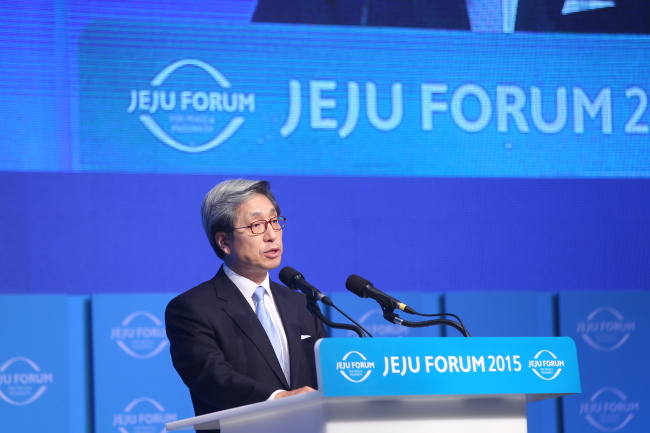[JEJU FORUM] ‘Jeju Forum to take comprehensive approach to peace’
By 손지영Published : May 23, 2016 - 18:59
Aiming to become the Asian version of the World Economic Forum, the Jeju Forum is once again inviting some 4,500 policymakers, business leaders and experts to Korea’s “Island of Peace” to discuss standout topics shaping the political and business landscape of East Asia and the world today.
The 11th Jeju Forum will take place under the theme “Asia’s New Order and Cooperative Leadership,” touching on a wide range of key regional and global issues, from the North Korean nuclear threat and regional diplomacy to climate change and the electric car revolution.
Ahead of the symposium’s kickoff on May 25, Jeju Forum Executive Committee chairman Moon Tae-young shared his insights, expectations and vision for the event.
The 11th Jeju Forum will take place under the theme “Asia’s New Order and Cooperative Leadership,” touching on a wide range of key regional and global issues, from the North Korean nuclear threat and regional diplomacy to climate change and the electric car revolution.
Ahead of the symposium’s kickoff on May 25, Jeju Forum Executive Committee chairman Moon Tae-young shared his insights, expectations and vision for the event.

Korea Herald: What are some key issues to look out for at this year’s forum?
Moon Tae-young: The Jeju Forum started in 2001 as a “peace forum” to promote multilateral security dialogue. The symposium was renamed the “Jeju Forum for Peace and Prosperity” in 2011, and has since grown in size and scope to go beyond its focus on international relations and security, encompassing diverse subjects linked to global businesses, environment, women, education and culture.
This year, around half of the forum’s 70 scheduled sessions will be dedicated to international relations and security, including nuclear security, the Northeast Asia Peace Initiative and sustainable development goals. The other half will focus on important topics regarding the international economy, renewable energy, climate change and women’s rights.
KH: What sets Jeju Forum apart from other international forums?
Moon: While the Davos-based World Economic Forum and China’s Boao Forum for Asia mainly focus on international business and management, Korea’s Jeju Forum has its roots in the international relations and security front.
Compared to the WEF, the Jeju Forum still has a long way to go in terms of international recognition and influence. It is similar to the Boao Forum in that it is organized by a private institution, but it receives active support from the government.
I believe that the Jeju Forum can play an integral role in dealing with various global issues as a “Track 1.5” diplomatic forum that invites both the public and private sectors to participate in multilateral dialogue and discussion.
KH: What efforts are being made to add more diversity to the Jeju Forum?
Moon: Initially founded as part of the government’s aim to promote Jejudo Island as an “Island of World Peace,” the forum has so far mainly focused on discussing global peace-related issues.
However, it is increasingly becoming difficult to mark clear boundaries in the session topics today, as diverse issues such as low growth, climate change, terrorism, infectious disease and cybersecurity all overlap and influence one another across physical borders.
Given this, we have been inviting various institutions and NGOs including the United Nations, the Korea International Cooperation Agency, the Human Development Institute and the World Culture Open to expand the forum’s scope to include diverse economic and sociocultural agendas.
As for the cultural aspect, we are inviting U.K.-born tenor Paul Potts and Korean singer Insooni to perform for the public this year, following Sumi Jo who performed for us last year.
KH: What were some major hardships faced in preparing for this year’s forum?
Moon: Securing a prominent speaker lineup, with influential and internationally acclaimed figures, is at the core of an international forum’s success.
Thus far, we have mainly relied a lot on our Korean diplomats around the world to help invite speakers to the Jeju Forum. My former experience as the Korean ambassador to Germany, Panama and other countries has certainly helped the preparation process as well.
We had been working for years to invite Ms. Aung San Suu Kyi of Myanmar to join our symposium. Given her positive response, we had high expectations for her presence this year. However, after winning Myanmar’s democratic elections in November 2015, she informed us that she would be unable to attend this year’s forum.
KH: How should Jeju Forum proceed in the future?
Moon: Originally founded as a dialogue for peace and cooperation, Jeju Forum must go further to redefine “peace” to include nontraditional security arenas -- such as climate change, energy, health, human rights, women and cyberspace.
How we use the Jeju Forum is up to the country. We must ensure that high-ranking government officials, including the president, are present each year, in order to strengthen the Jeju Forum as a globally recognized platform for discussing global agenda.
Though best known for its natural wonders, Jejudo Island is more than just a resort island. Geographically positioned in the center of Northeast Asia, the island is naturally a suitable location to host a discussion on sustainable peace and prosperity in the region. I hope that the Korean government will spare no expense and support in promoting the Jeju Forum’s future growth and development.








![[KH Explains] How should Korea adjust its trade defenses against Chinese EVs?](http://res.heraldm.com/phpwas/restmb_idxmake.php?idx=644&simg=/content/image/2024/04/15/20240415050562_0.jpg&u=20240415144419)










![[Today’s K-pop] Stray Kids to return soon: report](http://res.heraldm.com/phpwas/restmb_idxmake.php?idx=642&simg=/content/image/2024/04/16/20240416050713_0.jpg&u=)